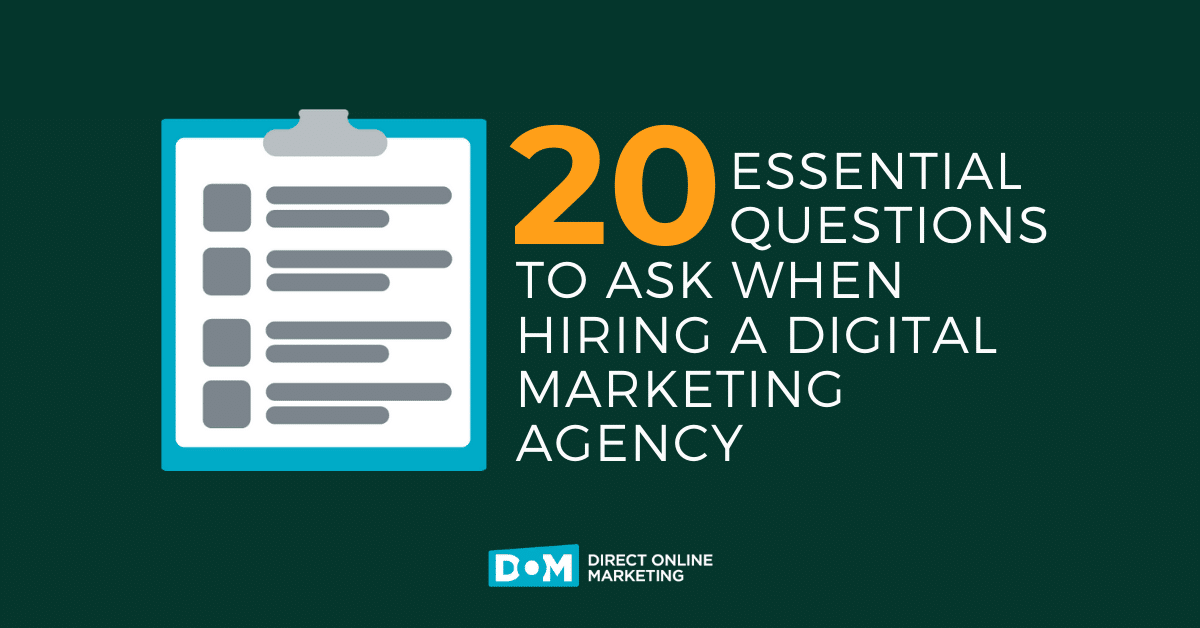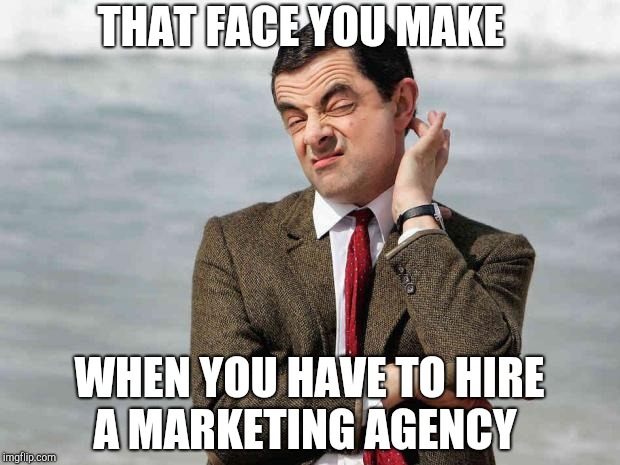20 Essential Questions To Ask When Hiring a Digital Marketing Agency (Updated For 2022)

Digital marketing will only become more complex as the landscape changes along with consumer behavior. Thank you for checking out this list of essential questions to ask a digital marketing agency before you set out to hire one.
Businesses that hesitate to adopt modern digital strategies will eventually fail without bringing on the right people to carry them out. For companies that don’t have the resources to expand their internal teams or just need a partner with specific expertise, digital agencies are the perfect solution. Choosing the right agency is nothing short of a monumental task.
By the end of this resource, you should have the answers to the most critical questions to ask a digital marketing agency as you are going through the evaluation process of seeking a new one to help your business grow with confidence.
Looking for this in a PDF?
Get it here.
(No form fill required)
Digital marketing is a vast field with countless strategies, concentrations, and nuances. Some of the largest companies on the planet have huge teams of marketers, all of which must be at the top of their game to stay ahead of the latest trends. As each discipline and digital platform evolves, keeping up with it all ends up being extremely taxing for smaller businesses that can’t maintain such large teams.
Acquiring new business online requires having seasoned talent with hands-on knowledge regarding the benefits and strengths of different platforms. Not only that, but these individuals also need to know how to execute. Strategy and consultation are meaningless without the people who can provide results.
Companies that wish to explore new territory or improve performance in a specific area of digital marketing will end up considering whether to hire fresh talent or partner with an online marketing agency. Evaluating the merits of in-house versus outsourced marketing is complicated; there are numerous factors to consider.
However, the fact that agencies leverage a pool of talented workers with diverse experiences means that companies who partner with them have the potential to get the highest return on their investment. Hiring specialists to work in-house usually equates to the cost of hiring an agency and very often even ends up being more expensive. Companies that partner with an agency can take advantage of a whole team of experts for less risk than hiring new internal employees.
Hiring an agency is far from easy, though. Finding the right fit can be time-consuming and downright frustrating. The agency selection process can feel like an awful chore:
- Some agencies make grand promises on which they can’t
- Some agencies fail to provide substantive proof of how they get
- Some agencies only specialize in extremely niche areas.
- Some agencies have restrictive, long-term contracts.
The above highlight just a few of the challenges in choosing an agency. Ultimately, results are what matter. While there’s no way of telling for sure whether investing with a specific agency will generate a positive return, vetting an agency is extremely important.
Be sure to ask and receive answers to the following questions to ask a digital marketing agency as part of your vetting process.
20 Questions To Ask A Digital Marketing Agency Before You Hire Them
1. Are My Expectations And Their Promises Realistic?
One of the biggest ways companies set themselves up for failure is when the bar is set beyond realistic heights. Having goals is good, but not when it involves going after the unachievable. When this happens, falling short of that high bar becomes inevitable.
This problem can go both ways. While a company may come to a prospective agency with impossible goals, many agencies make promises they simply can’t keep. It’s best to disqualify any company or agency that guarantees results.
Goals can more realistically be set for tasks pertaining to the quality of services, such as communication and reporting. Pay attention to these kinds of promises. Never be afraid to push to better understand how an agency intends to keep itself accountable with deliverables on a predetermined schedule.
2. Does The Contract Restrict Me Even When I’m Not Satisfied?
The contract length is something to keep in mind when choosing an agency. A common practice in the agency world is to draft contracts where clients must agree to minimum commitments of anywhere from six months up to a full year. That means that no matter if the agency is doing the work, the client still has to pay. That’s not to say that an agency with a year-long contract doesn’t do good work, but it doesn’t offer a whole lot of flexibility for the client if a marketing campaign goes south.
3. Do They Provide Unique Or Cookie-Cutter Strategies?
Agencies should have refined processes and procedures that empower them to provide repeatable outcomes. However, every business has unique needs, and formulating a strategy should not rely on a templated approach.
Assuming a company understands its goals, the right agency should be able to tailor a strategy in such a way to satisfy that client’s needs. In a perfect scenario, an agency would build all of its client strategies from the ground up, designing them individually to reach business goals and objectives.
When an agency puts forth a contract, understanding every aspect of it is crucial. Be aware of how long a contract will be and that longer ones are more restrictive. Some agencies offer month-to-month agreements where clients can choose to end the relationship for any reason.
4. Are They Both Tactical And Strategic?
Strategic planning is meaningless without boots on the ground to get things done. Depending on goals and needs, a company likely doesn’t just need a strategic partner; they also need a tactical one.
The only way to get a sense of whether an agency can execute is if they provide strategic timelines with deliverables and hard deadlines. While an agency won’t have specifics, make sure to ask about what the timeline will look like.
But the opposite must also be true. An agency that gets itself far too into the weeds, focusing only on tactics won’t get the job done either. The strategy ultimately dictates what tactics to use, and it is possible for an agency to be too tactical. Long-term campaign success requires always having an eye towards the future without getting too caught up in the day-to-day.
5. How Regular Are Communications?
Marketing success hinges upon routine and free-flowing communication. A disadvantage of outsourcing to an agency is that communication takes longer and can be a bit more difficult.
At a bare minimum, the best agency will always offer recurring meetings and campaign updates, typically weekly. This frequency is a default best practice; clients may, of course, have specific preferences outside of this schedule. A good agency should be flexible enough to provide the amount of communication the client needs to demonstrate campaign health.
6. Will I Get A Dedicated Point-Of-Contact?
No matter the size of an agency, the answer to this question should always be “yes.” Some agencies are so large that clients have to deal with customer service call centers rather than a dedicated account manager. It’s best to avoid agencies like this. Clients will end up feeling like just another number in a system.
Agencies need to provide that human touch, and an account manager should do exactly that. An account manager—as opposed to a more junior employee— ordinarily serves as the primary point-of-contact, as this person should have a comprehensive understanding of every aspect of the client’s campaign, coordinating with their team members accordingly. Account managers are there to serve. They should make themselves available to answer questions or provide insights with reasonable turnaround times.
Learn How We Have Answered
Many Of These Questions.
Experience The DOM Difference.
7. How Important Is Data To Them?
Every marketer should treat performance data like gold. Making decisions in today’s world without relying heavily on data is a mistake. While other factors should also be part of an agency’s decision making, campaigns live and die by data analysis.
Data should inform everything an agency does since it informs what’s going well, where to adjust, and where they need to go in the future.
8. How Tech-Savvy Are They?
An important consideration for selecting an agency is how they approach technology adaptation and innovation. Working in digital marketing requires knowledge of complex technology. Which is continually evolving. What may have generated results a decade ago may not be feasible in the present day.
For example, if you are seeking an agency that specializes in paid search, you should ask how they use automation tools and tactics to improve the overall return on investment.
9. Can They Help A Business Of My Size?
Many businesses care about whether an agency has direct experience with helping other companies in their industry. While some industries have specific tactics and strategies that work best, a competent digital agency has experience assimilating data quickly and adjusting to almost any industry and business.
The more important question is whether an agency is the right fit for a business of your size. An agency with mostly enterprise-level clients likely isn’t the best fit for a medium-sized manufacturer. Inversely, an agency that only assists local restaurants likely won’t be a good fit for a corporate franchise business.
Figure out what factors you value most in an agency relationship and choose accordingly.
10. Who Will Be Working On My Account?
Because companies pay agencies for their pool of talent, decision-makers have a right to know who works on their account. In addition to having an account manager, many agencies also provide a dedicated secondary or “backup” point-of-contact who has extensive knowledge on the account.
Your primary point-of-contact should have the necessary experience and support from a second person with the experience to fill in knowledge gaps. Keep in mind that while people leave from time to time, there shouldn’t be frequent changes in your contact to ensure consistency and maintain a positive long-term relationship. Additionally, you should never get the feeling of a “bait and switch” when your senior contact shortly after switches over to a more green person.
Beyond that, try asking questions about how many team members will work on the account as well as their qualifications. Note that due to the management of workloads, agencies may not be able to commit a specific person to your account until you commit to partnering with the agency.
11. What About The Agency’s Corporate Culture?
The core values of an agency foretell the kind of relationship you will have. Generally, consider agencies that are collaborative, innovative, and proactive. The best agencies really stand out when transparency and accountability are also baked into their corporate culture.
By asking questions about their corporate culture, this should also give some insight into an agency’s hiring process. Since the greatest benefit of partnering with an agency is its team, getting a measure of the agency’s talent is essential. Also, be sure to check out what employees say about working at the agency on sites like Glassdoor.
Learn What Our Team Members Love
About Working At DOM.
Visit Our Careers & Culture Page.
12. What Areas Do They Cover?
You need to understand the company’s needs and objectives. If the idea is to partner with someone to fill those gaps, focus on the areas that matter most. Some agencies specialize in one area or have a team that covers many. For example, a company may think they only need help with an SEO site migration, but fail to consider the need for ongoing SEO work.
13. How Exactly Do They Generate Results?
Not every agency will have the same approach for a given marketing area. The best ones have carefully created their own process to account for every single step of the way, including potential bumps in the road.
Selecting an agency is also tough because oftentimes decision-makers don’t know enough about a subject to ask the right questions. Perhaps a company does great work with content marketing but doesn’t have detailed SEO experience. Agencies who provide insights into their processes will always be the best choice.
14. Are They A Partner Or A Provider?
Companies should only seek agencies that act as an extension of their marketing team. An agency must deliver results, but they should also be proactive in improving the overall client relationship and the quality of their results.
15. Are They Transparent?
In addition to regular communication, choosing the right agency should also involve considering if they’re accountable and transparent. Results speak for themselves, and agencies need to be upfront at all times. A competent agency will know when to admit failure, and they will also know how to right the ship.
Companies hire agencies to get things done. A lack of clarity and honesty is a recipe for disaster.
16. What Credentials Do They Have?
Certifications and accreditations are essential indicators of an agency’s quality. These credentials must be bestowed by a reputable third-party to vouch for the work of a given agency. Some credentials even have different tiers to consider. Let’s say a company wants an agency that knows Google Ads inside and out. Their best bet would likely be to go with one that’s a member of the Top 200 Premier Google Partner program, an elite group of the best digital agencies that specialize in Google Ads.
Learn more about our team, credentials, and qualifications here.
17. Do They Have Case Studies Demonstrating Their Work?
Case studies communicate past success. They are summaries of challenges faced and solutions found. Reading over these pieces of content should grant a sense of the types of companies they help as well as what tactics generated such good results.
Steer clear of agencies that don’t have several compelling case studies to their name.
Check out a selection of our marketing campaign case studies here.
18. Do They Have Testimonials?
Testimonials say an awful lot about an agency. In particular, client testimonials that use branding and a direct quote from an actual person are huge credibility signals. These clients are so confident in the results of the agency that they put their name on it.
19. What Do Their Online Reviews Look Like?

Even if an agency has a high review score, be sure to read both positive and negative reviews to identify common threads across them. On top of the usual review aggregators like Google and Yelp, be sure also to check out agency-specific review platforms like Clutch.
One corollary of this item is the measurement of customer satisfaction.
Two industry standards for this measurement are Net Promoter Score (NPS) and SurveyMonkey’s global benchmark score. One thing to note about benchmarks is that they can vary widely among industries. For example, educational institutions tend to average an NPS of 71, while healthcare companies are lucky to get much higher than 27.
NPS is calculated using a simple survey question: how satisfied are you with the service you received? More detailed surveys are also available, but all it takes to create a reliable baseline is that one question, answered on a scale of 1 to 10. It is a fast, simple way to gather customer data. According to Retently.com, Digital Marketing Agencies average an NPS of around 61.
The other primary benchmark is calculated by surveys provided by SurveyMonkey, the leading provider of information-gathering services across many different business sectors. To calculate a SurveyMonkey Global Benchmark for each question, the company adds up individual scores to generate an average across all surveys. A digital marketing agency average at 44.
20. What About Pricing?
Companies should only seek agencies that act as an extension of their marketing team. An agency must deliver results, but they should also be proactive in improving the overall client relationship and the quality of their results.
20 Questions To Ask A Digital Marketing Agency: 4 Key Takeaways
Gathering as much information as possible about an agency will go a long way towards finding the best fit. Finding the right questions to ask a digital marketing agency may feel challenging; make no mistake. But in the end, any company can select a great agency provided that they always consider:
- The value of an agency is in its talent
- Regular communication is key
- Execution trumps good strategy
- Credibility is extremely important
Video: SEO or PPC?
Ready to learn more about DOM and how we can help your company grow confidently online? Contact us for a free, no-obligation consultation with one of our digital marketing experts.
Oh… and if you do contact us, feel free to pick from this list (or add to it) if you have any questions to ask a digital marketing agency.



